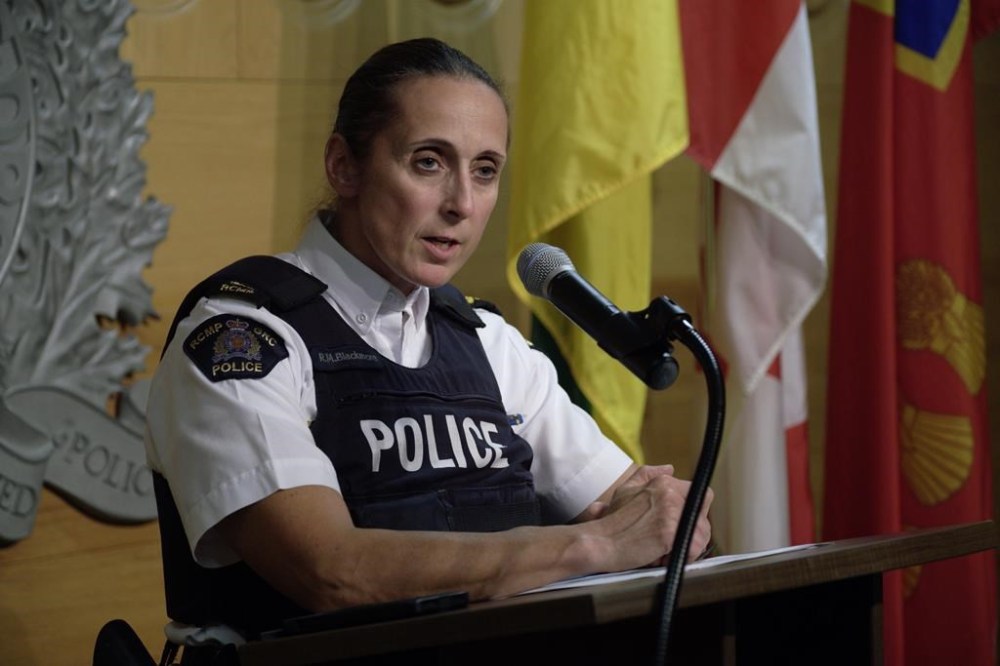RCMP apprehension unit wasn’t searching for Sask. suspect before stabbing rampage
Advertisement
Read this article for free:
or
Already have an account? Log in here »
To continue reading, please subscribe:
Monthly Digital Subscription
$0 for the first 4 weeks*
- Enjoy unlimited reading on winnipegfreepress.com
- Read the E-Edition, our digital replica newspaper
- Access News Break, our award-winning app
- Play interactive puzzles
*No charge for 4 weeks then price increases to the regular rate of $19.00 plus GST every four weeks. Offer available to new and qualified returning subscribers only. Cancel any time.
Monthly Digital Subscription
$4.75/week*
- Enjoy unlimited reading on winnipegfreepress.com
- Read the E-Edition, our digital replica newspaper
- Access News Break, our award-winning app
- Play interactive puzzles
*Billed as $19 plus GST every four weeks. Cancel any time.
To continue reading, please subscribe:
Add Free Press access to your Brandon Sun subscription for only an additional
$1 for the first 4 weeks*
*Your next subscription payment will increase by $1.00 and you will be charged $16.99 plus GST for four weeks. After four weeks, your payment will increase to $23.99 plus GST every four weeks.
Read unlimited articles for free today:
or
Already have an account? Log in here »
Hey there, time traveller!
This article was published 14/09/2022 (1181 days ago), so information in it may no longer be current.
OTTAWA – The RCMP says a special unit dedicated to apprehending fugitives was not actively searching for a Saskatchewan man they believe to be responsible for a stabbing rampage that left 11 people dead and 18 others injured.
Myles Sanderson is the main suspect in the attacks in James Smith Cree Nation and Weldon, Sask., which prompted a four-day manhunt last week.
He was arrested on a rural stretch of highway last Wednesday, after which police say he went into “medical distress” and died in their custody.

The Correctional Service of Canada says Sanderson left prison on statutory release in August 2021 and he was declared unlawfully at large in late May, more than 100 days before the stabbings took place.
Last year, the Saskatchewan RCMP created a dedicated unit to track down people who are wanted for violating conditions of their parole.
But the RCMP says the unit was not investigating Sanderson’s case while he was at large.
The force says officers currently have to manage more than 6,000 outstanding warrants, and the unit is focused on finding “high-profile” offenders and gang members.
The stabbings have raised questions about what police and correctional authorities ought to do when people with a violent criminal record violate the rules of their freedom.
Parole documents show Sanderson was convicted of 59 offences as an adult, including 28 for failure to comply with release conditions or failure to appear in court. His criminal record included violent assaults, including against people who were victims in the recent attacks.
In May, Crime Stoppers released a notice that Sanderson was wanted for arrest and had last been seen in Saskatoon. A copy of the warrant issued for Sanderson’s arrest in May listed him as having no fixed address.
Saskatoon is one of the two locations for the new provincially funded, RCMP-staffed program that works with municipal police to track down high-profile offenders with outstanding warrants.
The Saskatchewan Ministry of Justice says the RCMP controls the unit’s operations.
In a statement, the Saskatchewan RCMP says the warrant enforcement and suppression unit was not actively investigating Sanderson for being unlawfully at large in the months leading up to the attacks.
It says that as of Sept. 10, investigators were monitoring a list of 63 people declared unlawfully at large by Correctional Service Canada in the province.
It says the unit receives many requests a day and “supports the apprehension of high-profile offenders and gang members with outstanding warrants.”
“(It) prioritizes individuals unlawfully at large who are actively committing violent offences,” a spokesperson said. “Investigators also consider the levels of violence against persons, propensity to reoffend, seriousness of offences and potential gang affiliation.”
An analytical team also tracks locations where crime is on the rise to help investigators focus their efforts, and the force says it prioritizes the RCMP’s jurisdiction in rural areas.
The RCMP says the unit began enforcement in May and, “as you can imagine, it takes time to fully implement a new team.” So far, the four investigators have made 12 arrests. The RCMP says it is also hiring two more officers for the unit.
There are about 6,680 outstanding arrest warrants in Saskatchewan, the RCMP says.
In Sanderson’s case, Correctional Service Canada and the Parole Board are convening a joint board of investigation to determine whether policies and protocols were followed and make recommendations.
It is not clear when that investigation will begin, but the federal government says it will share the results publicly.
This report by The Canadian Press was first published Sept. 14, 2022.




